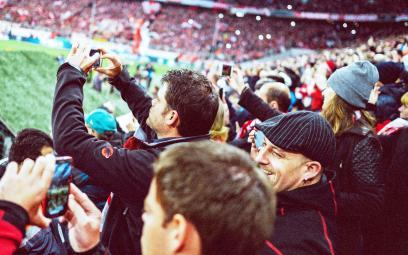
Posted on 21 September 2023
When the Football Gets Under Way, Survivors of Domestic Abuse Prepare for the Worst
Posted in Advice
Ah football. It may not be the official sport of the UK, but it is the most popular. Football has been around these parts so long that we can almost pretend we invented it. It takes pride of place in our hearts with our other British commodities. So much so that it’s even referenced in other forms of popular culture.
“The country of Shakespeare, Churchill, the Beatles, Sean Connery, Harry Potter. David Beckham's right foot. David Beckham's left foot, come to that...”
The immortal words spoken by Hugh Grant in the film, Love Actually. In which he plays the brave Prime Minister fighting back against the tyrannical USA. With football references. Rather ironically, the fictional Prime Minister follows up his glowing UK-centric rhetoric with:
“... and a friend who bullies us is no longer a friend.”
Because, while we can pretend that football is a harmless game enjoyed by all, underneath its surface lingers a dark and dirty underbelly that has been brushed over for generations.
True, it’s a game that brings us together; giving us talking points, showing people who we are and what we believe in. Something that makes us feel a sense of togetherness that other sports have struggled to compete with. We feel a sense of belonging, and a fierce, unwavering pride in our teams. Even if those teams are failing. Especially if those teams are failing. We will fight to the death for our clan.
For honour. For valour. For football!
The Beautiful Game Has an Ugly Side
The saying goes that football is a gentlemen’s game played by hooligans. And while it’s unfair to tar all football fans with the same brush, there's a long history of violence in and around the sport. It’s not a good sign that fans of the two teams must be separated during the match to avoid fights breaking out. The show of hostility from one team to the next often extends well beyond the pitch. Real-life assaults have occurred due to differences of opinion down the pub. This is not friendly competition.
Security officers and the police force have their work cut out for them after important football matches. Breaking up fights, preventing vandalism and sending football fans home to calm down makes up a large part of their duties once matches are over. You might think every fight that’s been broken up between fans is one less violent occurrence on the streets and that can only be a good thing.
But what happens when those fans reach home? Reports of domestic abuse rise by between 25% and 50% before and particularly after big football matches. Removing the violence from the public arena is important, but that doesn’t change the attitude of those who have been sent on their way. Where does that pent up aggression go once football fans are forced to go home?
The shocking thing is that it can’t all be blamed on a mob mentality that comes with being around other fans. Those watching the match on television make up a large part of that statistic too.
Violence and Football Have a Shocking Correlation
We’ve touched on the number of domestic assault cases and football matches, but there are more points to consider. This handful of metrics might just be the most significant.
- 71% of football fans are male
- 92% of all domestic violence reported is perpetrated by cisgender (a person whose gender identity corresponds to their sex assigned at birth) men
- Public disorder and vandalism increase by 36% after football matches
- 47% of football-related domestic violence is due to alcohol abuse
- The number of domestic abuse reports increases by 26% when the perpetrator’s team wins or draws
- When a fan’s team loses, that number is more like 38%
- In the UK, 2 women are murdered by a partner every week
It’s important to note that not all football fans are male and not all domestic violence is perpetrated by men on women. However, the numbers don’t lie. And the more the industry buries its head in the sand on these issues, the less likely it is to find a solution that ensures the safety of women and children.
Why Exactly is there a Link Between Football Matches and Domestic Violence?
Heightened Emotions & Cultural Norms
Football matches can evoke intense emotions, both positive and negative. In situations like this, the crowd can be sent into a frenzy. On top of that, there’s the social pressures to behave a certain way. And if rape and assault are normalised within a large group of people, it can be difficult to understand that acting on those behaviours has real-world consequences.
The passion surrounding matches can lead to intense emotional states, which in turn might be a contributing factor in increasing aggressive behaviours. When large groups of people gather to watch matches, there is a potential for mob mentality and peer pressure to influence individuals. This can sometimes lead to a heightened sense of aggression and an increased likelihood of violence.
Booze & Stereotypes
Beer and football go hand in hand. If you look at brands like Stella Artois, a lager that has gained the tagline of “Wife Beater,” you can see that the issue runs deeper than just excitement about a football game. It’s woven into the very tapestry of “lad” culture and banter. A tradition unique to the UK.
Football matches are associated with increased alcohol consumption, especially when fans gather to watch games in pubs or at home. We all know that excessive drinking can impair judgment and self-control. And that often leads to a higher likelihood of conflicts and violence.
Football Frustrations & Relationship Issues
More often than not, those in relationships that are already in an abuse cycle are the most likely to see an increase in domestic violence before and after football matches. However, all the above factors can make tensions and conflicts within a relationship worse. Even when there have previously been no physical fights. An already strained relationship might be pushed to its limits during emotionally charged events.
The outcome of a football match can affect the emotions of fans. When a favoured team loses or performs poorly, some individuals might channel their frustration and disappointment into negative behaviours. Including taking it out on family members or partners. And the same thing can happen when the team wins too, because of heightened excitement levels.
Domestic violence is also not limited to adults, with children often bearing the brunt of abuse at the hands of an aggressive parent. This is more concerning than adult abuse. Children will often take the behaviours of their caregivers with them into their own adulthoods. In this way, abusive behaviour is perpetuated over generations.
Rape and Assault Woven into the Fabric of Football Culture
While there is the wider issue of addressing men’s mental health as a way to stop violent crimes, it doesn’t mean that we should ignore the glaring issues in our established systems. Football associations have been aware of the link between domestic violence and football matches for many years. Sadly, while issues such as racism, homophobia and corruption are addressed often in the world of football, the industry falls silent and backs away from the link between football and domestic violence.
The language used among football fans can be very problematic. When a winger beats a defender, it is often referred to as ‘a rape’. The word is bandied around as if it’s no more than a technical term. However, several high-profile male footballers have been accused of sexual assault or violence against women and are still allowed to play. While some of these reports may be spurious, the fact that they’re not seen to be taken seriously by the clubs suggests that they feel violence against women is not a big deal. It reinforces the idea that equal rights don’t matter – that women lie, and if they haven’t lied, it doesn’t matter anyway.
In day-to-day life, even your most avid football fan has enough distance from the game to understand that violence towards women isn’t acceptable. But football is a break from the norm and it’s easy to get swept up in the excitement of it all.
Support for Victims of Abuse Within Families
Sadly, there are a high number of instances of sexual and physical abuse and assault occurring within the family home, whether by family members or friends. And that's before you consider the additional pressure of football-related domestic violence.
Both children and adults can be vulnerable and open to abuse in the domestic environment and it is one of the places that abuse and assault often remains unreported and undetected for many years. In some circumstances, if social services or other professionals have been involved with the family, there may be a claim against the local authority or agency, but these claims are quite difficult. It can also be difficult to bring a civil claim against the Individual in these circumstances, but you may be entitled to Criminal Injuries Compensation.
If you or someone you know has suffered abuse by a family member or within your own home you can contact our specialist team for advice.
